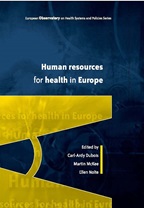
Health professionals’ education and training
- interprofessional education;
- competency-based education;
- the academization of health professions.
- Health Professional education (with a focus on doctors and nurses) including basic and (post) graduate education or specialization;
- Creating conditions for lifelong learning and continuous professional development;
- Cross-border collaboration in health workforce development;
- Cross-border training experiences of health professionals;
- Training for skill-mix innovations in primary and chronic care (forthcoming).
Health and care workforce topics
Related publications
Key messages: There is an urgent but often unmet need to ensure Europe’s health and care workforce have the right digital skills and competencies....
Green skills for a sustainable future: Building a climate-smart health and care workforce in the European...
Key messages: Equipping the health and care workforce with ‘green skills’ is vital in enabling the health systems of the European Union...
How can structured cooperation between countries address health workforce challenges related to highly...
This policy brief draws on the experience of different cross-border collaborations in highly specialized health care in order to address health workforce...
Health professional mobility in a changing Europe: new dynamics, mobile individuals and diverse responses
Health professional mobility in Europe has become a fast-moving target for policy-makers. It is evolving rapidly in direction and magnitude as a consequence...
How to create conditions for adapting physicians’ skills to new needs and lifelong learning
This Policy Brief examines the key measures necessary for creating the conditions that allow physicians to adapt their skills in the context of professional...

Human resources for health in Europe
Human resources are key determinants of health service performance. They are the largest and most expensive input into health care, yet can be the most...
Subscribe to our newsletter
Sign Up